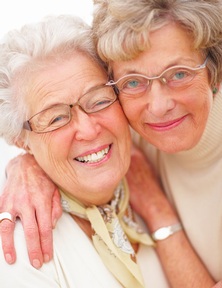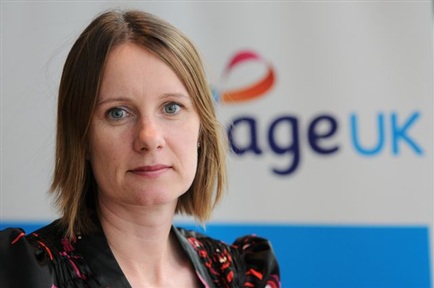The Rainbow Lives Project, which offers diversity training for care workers, has called for more care homes to offer training after a woman attempted suicide due to homophobic bullying.
Homophobia can be a real problem in care homes as older people often have entrenched views and grew up in times when it was illegal to be gay.
Jenny-Anne Bishop, who helps run the Rainbow Lives Project, said: “The lady tried to commit suicide because she was discriminated against in the care home. The other residents wouldn’t eat with her and they wouldn’t let her join in with any of the activities. The care home staff there didn’t do anything about it and she found they reduced the care they gave her. She has now moved to another care home where she has started to thrive again.
“She is in her early 80s. It is very hard for LGBT (Lesbian, Gay, Bisexual and Transgender) people in care homes as it is often older people who have the biggest difficulty in accepting them.
“Staff in care homes definitely need proper training and care homes need to make it clear that LGBT people are welcome. Most police stations in North Wales have a rainbow sticker showing they are LGBT friendly. I would like to see care homes doing the same thing. It is simple things like that, that make a difference.”
Ms Bishop believes if care home managers and key staff had high quality training, residents would realise that homophobia is not tolerated in the care home and attitudes would change.
“It is all about having a policy to say we won’t have discrimination and everybody’s human rights must be respected,” she says.
In many care homes, people who have been ‘out’ all their lives suddenly feel they have to hide their sexuality and keep it a secret.

Paul Foster, aged 88, who lives in a care home in Merseyside, says: “Though of a comparatively high standard of accommodation, I don’t think my care home is a particularly easy place for a gay man to live. They know about me but I have to be discreet, which I never used to be. Also, my gay friends tend not to visit me any more, not being made to feel welcome and also feeling it could make life difficult for me.”
His experience is all too common for LGBT people in care homes.
The Civil Partnership Act 2004 means same-sex couples in civil partnerships must be treated the same as married couples and any policies or practices should reflect this.
The Equality Act 2010 outlaws discrimination when providing any goods, facilities and services on the grounds of someone’s sexual orientation or perceived sexual orientation.
Importantly for older gay people living in a care home, this act means it is unlawful to refuse to house a same-sex couple together in a care home if a heterosexual couple in similar circumstances would be housed together.
Martin Green, chief executive of the English Community Care Association (ECCA) says: “Lesbian and gay people should have the same rights to receive services that meet their needs as any other citizen. This is a legal requirement, and every care service should be mindful of these legal responsibilities, but beyond that, it is also central to the notion of personalised care services, and every good provider will strive to eradicate ignorance and prejudice and ensure that their services treat every individual with dignity and respect”
Stonewall, which works to achieve equality and justice for lesbians, gay men and bisexual people, recently developed guidance for care home workers on how to support gay residents.
‘Working with older lesbian, gay and bisexual people’ covers the current legal situation, how to engage with older people and offers recommendations for care and support workers.
James Taylor, Stonewall senior health officer said: ‘For the one million lesbian, gay and bisexual people in Britain over the age of 55 growing old is a real concern.”
He hopes the new guidance will have an immediate and practical impact as “changes to policy and staff training can make things better”.
He adds: “But it can be the simple things too, such as awareness and communication. We hope this guide helps professionals deliver better services, treating all older people with dignity and respect they deserve.”

The guidance includes tips such as encouraging staff to use open language rather than assume residents are heterosexual and including pictures of lesbian, gay and bisexual people in care home promotional literature and information packs.
Stonewall also recommends making same-sex partners feel welcome by allowing private time for couples and the sharing of rooms and making sure residents know about any codes of conduct that include sexual orientation discrimination and can complain if necessary.
The best care homes have a zero-tolerance approach to bullying and harassment and need to act immediately if this behaviour occurs, says the guidance.
Charities including Stonewall and Opening Doors London, recently claimed that they had found strong anecdotal evidence to suggest residents in care homes regularly suffer homophobic bullying from care staff.
Researchers believe this may partly be due to the care sector’s tendency to rely on migrant workers, who can come from strongly religious backgrounds, where homosexuality is taboo.
Between five to seven per cent of the UK population is estimated to be gay and Age Concern believes it is likely older lesbian, gay and bisexual people are over-represented amongst those needing formal support as they are less likely to have children, more likely to be out of touch with their birth families and their own children and 2.5 times more likely than heterosexual older people to be living alone.
Older transgender people can face considerable prejudice and Age Concern says they will have extra needs in terms of their personal care, such as the need to shave, catheterise or find appropriate gender clothing in the right size.
Unfortunately too many care providers have yet to realise LGBT issues need to be actively tackled in order to make sure care homes are gay-friendly. Anchor is one of the few care home providers doing its best to make LGBT people feel welcome.
The care home provider set up a lesbian, gay, bisexual and transgender group for residents three years ago.
The organisation has won two TPAS (Tenant Participation Advisory Service) Connecting People awards and was shortlisted this year in the equality and diversity category.
Brenda Metcalfe, coordinator of Anchor’s LGBT group, says: “It is a national group which meets monthly at different locations all over the UK. A while ago we had staff ask us if it was open to them and we asked the group so now it is for both residents and staff.
“Unfortunately we don’t have many care home residents and most come from sheltered accommodation but over the next 12 months we are going to try and change this. Next month, we are going to hold the meeting in a care home in the centre of the country to make it more accessible for care home residents. We have been holding the meetings in locations away from the homes for reasons of confidentiality but we realise it doesn’t make it very accessible for residents.
“Care home residents are the hardest group to reach. We have had people tell us they have been out all their life and now feel they have to keep their sexuality secret. We hope we are doing our best to change this. In a care home, you often don’t feel in control of your own privacy. But people should be able to put up photographs of their partners and read what books they like without feeling they are being judged.”
The LGBT group members at Anchor helped to co-write ‘Everyone Welcome’, a guide ensuring that care home staff are equipped to provide care, dignity and respect to all residents.
George Montague, who lives in Brighton, is campaigning to have a specialist gay retirement home. A place “where they can retire and not feel discriminated against”.
However Ms Bishop from the Rainbow Trust Project and member of the Parliamentary Forum on Gender Equality is wary of this as she feels that can lead to ghettoising. “I feel it is about integrating with the whole community. I am optimistic that things are improving and will continue to improve. However I feel there is still a long way to go.”
 Michelle Mitchell, charity director general at Age UK
Michelle Mitchell, charity director general at Age UK
Michelle Mitchell, charity director general at Age UK feels that while some progress has been made in raising awareness about the issues facing older LGBT people in care homes “there is still a lack of knowledge about individual needs such as the importance of same-sex partners being fully involved in any discussions about a resident’s care”.
She says: “There is a widespread assumption that older people just don’t have any sexual orientation and care workers often feel that it is a private issue and one not to be discussed. That said we are worried about a hidden minority of residents who may be experiencing homophobic care – which is unlawful and unacceptable. We are also aware that many older people would have been alive in times when it was illegal to have a relationship with someone from the same sex and our concern is that some older people will wrongly feel they have to hide who they are because they are scared of how people will react.
“It is important that older people are able to speak out about the care they receive and that this is no longer a taboo subject.”
This article first appeared in carehome.co.uk







